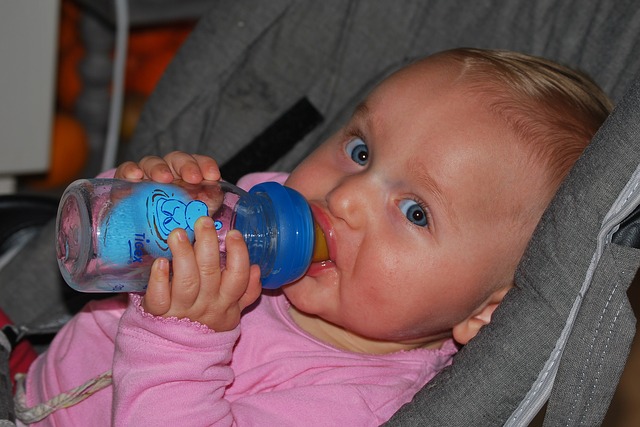by Kylie Hastings
Shortly after I found out I was pregnant with our second child my breast milk supplies began to diminish — the one in my breasts and the one in my freezer. Our daughter wanted to eat more and more and I had less and less to give her and it was heartbreaking. We were just two months from our one-year goal and she was eating food but it seemed she needed some sort of milk to drink- besides mine. I had a meltdown one night because my husband said, “We could try formula.”

We never did have to use formula, we found other options I was more comfortable with, but I think back to that meltdown often. Why had I reacted with such emotion? It seemed as if I was afraid, but of what? After much soul searching I know that in my mind, “formula,” had become a sign of failure- for me, not anyone else. It has never really mattered to me if a mom found she could not breastfeed and used formula instead. I was exclusively formula fed as a baby.
It was my own personal demons I was battling that night.
Despite coming to that conclusion the question has remained in the back of my mind, “What exactly is so wrong with formula?” I had read articles and blog posts on the subject as a friend of mine found herself struggling with breastfeeding and in need of advice but I mostly found opinion, anger, and a lack of evidence.
A lack of evidence, as it seems, becomes a trend in pregnancy and parenthood.
But I didn’t want to write an article based in opinion, or clouded by my own personal demons. I wanted an unbiased look at formula in America, so I went straight to the source–the FDA. Were the claims true that formula companies could put anything they want into that little can and call it good?
I’m disappointed to report that this claim is (almost) true. The FDA only requires twenty-six ingredients in milk based baby formula and has no limit to additives beyond that. Twenty-six ingredients, when breast milk contains over three hundred. There is no requirement for the companies to inform you as a parent as to how much of each of these twenty-six ingredients go into the formula, only that they stay between the FDA minimums and maximums. This is, though disappointing on it’s surface, an upgrade because it wasn’t until a major manufacturer chose to leave out salt in the 1970s and a large number of babies became sick that we began regulating infant formula. Even now according to the FDA’s website, “The FDA does not approve infant formulas before they are marketed.” Formula companies as simply required registering with the FDA and be subject to testing by the FDA. There is no specification as to when this testing occurs, nor how often. As far as I can find, these requirements do not change for formulas made for premature infants or infants with allergies.
One of the biggest concerns my friend Tiffany shared with me was, “I wish they wouldn’t use corn syrup!” and being a person who has never used formula I had to look into this. Why would they use corn syrup, and surely it wasn’t much? Well those are questions we cannot know the answers to as NBC Chicago recently found when a grandmother came to them with the same concern. She had noticed that there was no indication on her granddaughter’s can of Enfamil as to how much sugar the product contained. NBC hired a lab to analyze the product (and similar products) and found that several were high in sucrose- a form of sugar banned from formula in other countries.
Often when we talk about formula we blame it for a struggle with weight and diabetes later in life, but should we instead be blaming the sucrose that is freely added to formula with no FDA oversight? Michael Taylor, the FDA’s deputy commissioner for foods, says, “The FDA sets high quality standards for infant formulas because nutritional deficiencies during this critical time of development can have a significant impact on a child’s long-term health and well-being,” but it seems as if the FDA is doing the bare-minimum instead of setting, “high quality standards.”
The levels required for ingredients in formula, particularly when pertaining to protein, are curious. There is a fairly wide range- 1.8 grams being the minimum and 4.5 grams being the maximum, and the minimum is far below what is recommended by the European Food Safety Authority and the maximum is far above what is recommended by EFSA. America based formula companies, creating an obvious conflict of interest, fund and oversee most scientific research concerning formula. I found, just through a general perusal of formulas, that those containing the minimum amounts were the cheapest formulas and often contained corn syrup as the first ingredient. This is a sad view of what we are setting low-income families up with. And what for? We need to be asking why there aren’t more regulations.
This year there was a breakthrough concerning FDA regulation, though it was almost twenty years in the making. They now require that all formula companies thoroughly test for salmonella and other infectious agents. Yes, you read that correctly- up until now that was not a requirement; it was up to the manufacturer’s discretion. This decision was stalled for almost twenty years and this stall caused many babies over that time span to get sick and even die. This is unacceptable.
I have found, while being a breastfeeding advocate, that many people are offended by what I promote. They believe that I am saying that by not choosing or being able to do what I promote they are endangering their child. They are hurt. They are trying to battle their own demons and they see articles that are pro-breastfeeding as a personal attack. I don’t want them to feel that way. I think that those that breastfeed and those that formula feed can quite easily get on the platform of parenting together, and fight this lack of oversight from the FDA because it affects all of us as a society. Formula is not evil. You never know for sure with each child whether or not you will end up needing it. It saves many babies every year and it is something we need in this society. The hard truth is that around 1% of women are physically unable to breastfeed, 21 out of every 100,000 new mothers in the U.S. die in child birth, and due greatly to a lack of postpartum support in the U.S. only 46% of mothers are able to breastfeed to six months. These statistics don’t even touch the amount of children given up for adoption or abandoned. These hard truths mean our babies need the option of formula as a healthy back up. Sure, there is the option of a wet-nurse and donated milk which are wonderful options I highly recommend but there are not currently enough women participating in this to meet the need. With this need existing, we must as parents and out of sheer principal begin pushing for more research, more evidence, and more regulation over this substance that many babies rely on as a sole source of nutrition for the first year of their lives. “Breast is best,” but this doesn’t mean that our back up should not be prepared and at the highest level of effectiveness it can be.
In the 1986 amendment to the Formula act of 1980, Senator Metzenbaum was quoted as saying, “There is simply no margin for error in the production of baby formula. An infant relies on the formula to sustain life and provide the proper nourishment at a time of rapid physical and mental development.” I cannot agree with him more, and I think its time we reminded the FDA of this and hold formula companies accountable. We can do better than the bare minimum.
To see a list of ingredients in both formula and breast milk click here.
 Kylie Hastings is an Oklahoma girl who is making the big move to New Jersey. She is a Criminal Justice graduate of Northern Oklahoma and The University of Central Oklahoma. She currently writes the blog Someonematernal.com and hopes to one day write the next great American novel…or at least publish a book that a few people buy. She is the Mother of a little girl and soon to be mother of a little boy, and the wife of an Army National Guard Blackhawk pilot. She loves to read, travel, ski, and scuba dive. You can follow her on Twitter @SimplyKylieC5.
Kylie Hastings is an Oklahoma girl who is making the big move to New Jersey. She is a Criminal Justice graduate of Northern Oklahoma and The University of Central Oklahoma. She currently writes the blog Someonematernal.com and hopes to one day write the next great American novel…or at least publish a book that a few people buy. She is the Mother of a little girl and soon to be mother of a little boy, and the wife of an Army National Guard Blackhawk pilot. She loves to read, travel, ski, and scuba dive. You can follow her on Twitter @SimplyKylieC5.


3 comments
The FDA is like all the rest of our government agencies now–corrupt, greedy and money driven. That is why the FDA allows our food sources to be full of poisons, and be genetically changed–because they profit from that–the companies doing the evil deeds to our food sources pay big bucks to have their products "pass inspections" by the FDA. Same with medicines–Big Pharmacology profits from allowing totally bad drugs on the market for a price. And any good or natural substances that provide nutritional or medicinal remedies won't be approved by either. If they can't profit from it it won't be allowed to exist. Very sad state of affairs. My advice to new parents concerned with the formulas out there available for their babies after breast milk runs out, get a goat; goat's milk is pure and easily digested by babies.
From an article titled “An Unbiased Look” you seem to be missing some key facts, mainly that 1% of women cannot breastfeed. There is nothing to substantiate that number, and thus far no one has been able to actually give a number to the woman who cannot breastfeed. But newer research is showing that it is 5-15% of women who are physically unable to breastfeed.
Despite our difference in research I believe my point stands.
As a society we need formula, and as a society we should be pushing the FDA for more regulation of formula.